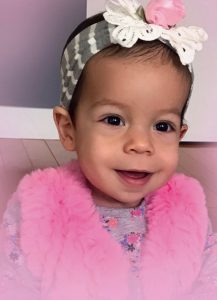
There are 20-25 pediatric conditions that can predispose a young child to high blood pressure. When a kid with one of them comes into a Children’s Hospital of Philadelphia location, an alert goes off in the network’s digital chart.
It says, essentially, that “this child is at high risk for hypertension,” said Dr. Rachel Hachen of CHOP’s Division of General Pediatrics.
Given the risk, Hachen continued, “This is what you need to do: Get the child’s blood pressure.”
This only happened with 2% of high-risk children under 3 before Jessica and Dan Roomberg, a Jewish couple from suburban Philadelphia, helped convince CHOP leaders that it needed to happen more often.
It was the 2019 death of their 17-month-old daughter, Mila Gray Roomberg, that spurred them to action. Mila died from a rare vascular manifestation of a genetic disorder, Neurofibromatosis Type 1. Months later, her parents started the Magical Mila Foundation, which has raised more than $400,000 for equipment, tests and educational materials that have helped CHOP take the blood pressure of high-risk children.
CHOP now goes through its testing process with about 40% of the high-risk children in its network.
“It was because of the Roombergs that our eyes were opened,” Hachen said.
Jessica Roomberg, now 35, and Dan Roomberg, 37, could barely open their eyes in the weeks after Mila’s passing.
“We went from having the greatest 17 months of our life, with an amazing little girl. Mila was super special. She was so happy and joyous and wonderful and beautiful and strong,” Jessica Roomberg said. “Every day revolved around her schedule, her needs, her wants.”
The Congregation Or Ami members felt like they had to find a way to keep parenting Mila. They also needed something to occupy their minds. The Magical Mila Foundation was born.
Three weeks later, they met with the CHOP doctors who had cared for their daughter. Jessica Roomberg explained how, during Mila’s medical care, it was hard to get a doctor or nurse to take her blood pressure. The American Academy of Pediatrics did not require the test for children under 3 unless they were high-risk and, even though Mila was, “It either wasn’t getting done or when it was, it wasn’t taken correctly,” the mother said. It would be done on her leg, when the only way to get it for a child would be on her right arm. Or they would squeeze too tightly, and Mila would scream, leading to an inaccurate reading.
Mila’s blood pressure was not taken correctly until she was 14 months old, according to her mother. It was 240 over 110.
“She was going through her whole life with high blood pressure,” Jessica Roomberg said. “How many kids are walking around with high blood pressure?”
“At that point, it shifted from being selfish to carrying on her legacy to impact other people’s lives,” Dan Roomberg said.

The Roombergs started planning the foundation’s first event, building the website and meeting with a marketing agency. The parents set the initial fundraiser for that summer at Maynard’s in Margate, New Jersey. In the months leading to the event, the couple was “hiding from the world,” Jessica Roomberg said. They were worried that people would say, “Oh, there goes Jess and Dan,” the mother added.
Five hundred people came. At its coming-out party, the Magical Mila Foundation raised $110,000.
“It was like the whole community embraced us at once. They were going to be there for us,” Dan Roomberg said.
After that event, the Roombergs had weekly meetings with their CHOP doctors. They funded a clinical trial to find a better blood pressure device and created educational materials for medical staff, like “little cheat sheets” about the testing process, as Dan Roomberg called them, for nurses to wear next to their IDs.
Within two years, “We saw a 200% increase in blood pressure measurements in children under 3,” he said.
CHOP leaders are spreading the process to their primary care locations in the Philadelphia area. And on May 1, Drs. Hachen and Kevin Meyers presented it to the Pediatric Academic Societies Meeting in Washington, D.C.
“They’ve helped us put it on the agenda. Everybody’s starting to look at it,” Hachen said.
But for the Roombergs, every morning is still hard. The parents often think, “Why us?” But then they get up to keep parenting Mila, as well as their other two children, 3-year-old son, Liam, and 1-year-old daughter, Meadow.
“I’m proud of us. But I know we have more work to do,” Jessica Roomberg said.
To donate to the Magical Mila Foundation and to learn about its upcoming events, visit magicalmilafoundation.org.






